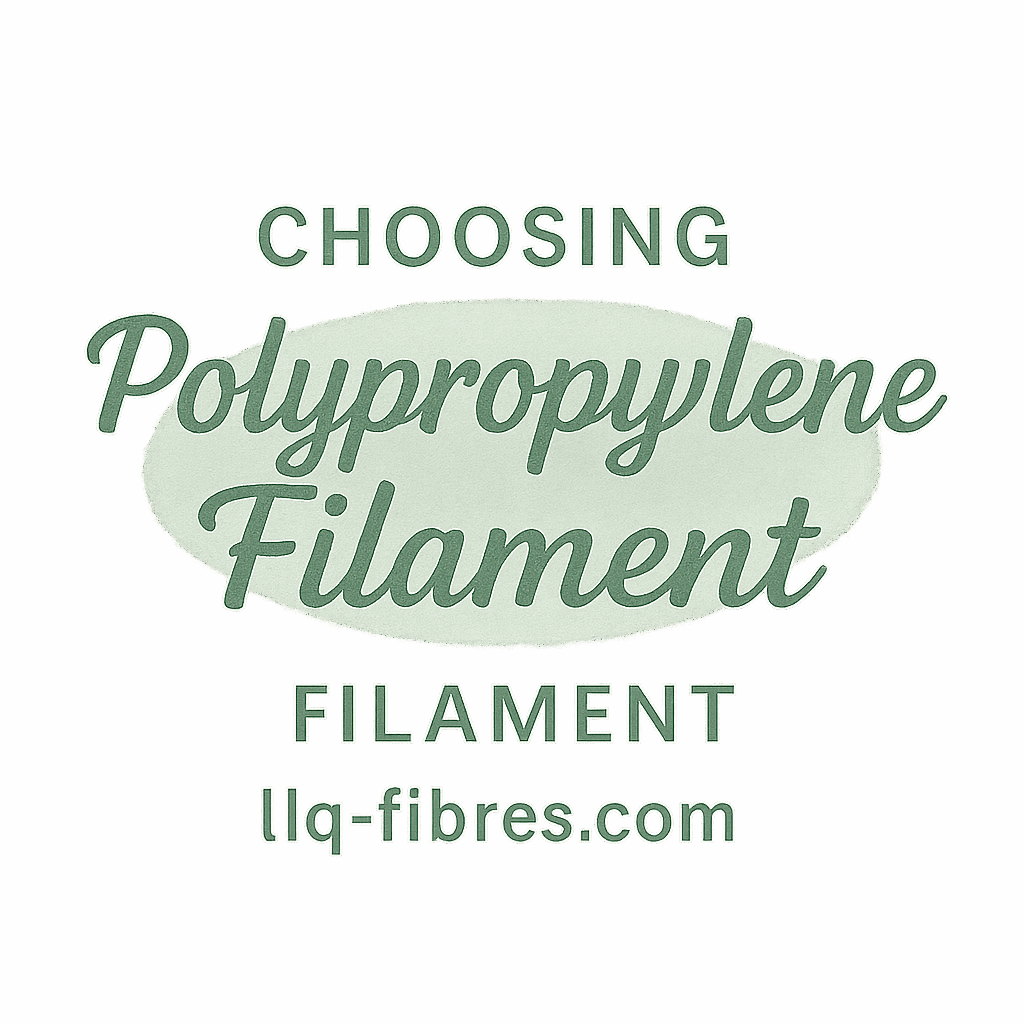7 Key Benefits of Polypropylene Filament in Industrial Rope Applications
Polypropylene filament has emerged as a critical material in the world of industrial ropes, offering numerous advantages that make it indispensable for various industries. From its lightweight nature to its remarkable resistance to environmental factors, polypropylene filament ropes are preferred in sectors such as agriculture, construction, and marine operations. In this article, we’ll explore the seven key benefits of using polypropylene filament ropes and why they are a go-to solution for many industrial applications.
What is Polypropylene Filament?
Polypropylene filament is a type of synthetic polymer created by polymerizing monomers of propylene. It’s known for its strength, flexibility, and resistance to harsh conditions, making it a top choice in the manufacturing of ropes used in a wide variety of industries. Whether you need a rope for agricultural tasks or marine applications, polypropylene filaments provide the reliability and performance you need.

What Makes Polypropylene Filament Ideal for Ropes?
Polypropylene filament ropes are highly valued for their excellent balance of strength, resistance, and ease of handling. Their unique properties make them well-suited for the rigorous demands of industrial applications. From heavy-duty ropes used in construction to agricultural ropes, these filaments outperform natural fibers in many ways.
Strength and Durability
Polypropylene filament ropes are renowned for their strength and durability. These ropes can endure significant stress, making them ideal for industries that require reliable performance under pressure. They maintain their structural integrity even under heavy loads, reducing the need for frequent replacements.
Resistance to Chemicals and Moisture
The ability of polypropylene filament ropes to resist moisture and chemicals is another compelling advantage. Polypropylene doesn’t absorb water, making it ideal for marine environments and industries exposed to chemicals. The ropes resist rot, mildew, and corrosion, ensuring a longer operational lifespan and lower maintenance costs.
Lightweight and Easy to Handle
Polypropylene filament ropes are lighter compared to other rope materials, which makes them easier to handle in agriculture, construction, and other industrial applications. The light weight allows for easier transport and reduces strain on workers, enhancing productivity and safety.
Top Benefits of Polypropylene Filament in Industrial Ropes
Let’s now delve into the seven key benefits of polypropylene filament ropes that make them the preferred choice in industrial settings.
Benefit 1: High Strength-to-Weight Ratio
One of the standout features of polypropylene filament ropes is their strength-to-weight ratio. These ropes are strong yet lightweight, which makes them ideal for lifting heavy loads and performing other high-stress tasks without the added bulk of traditional materials.
Benefit 2: UV Resistance and Durability
Polypropylene filaments are naturally UV-resistant, which is a crucial property for ropes that will be exposed to the sun for extended periods. UV resistance ensures that the ropes won’t degrade or lose strength when subjected to outdoor conditions, making them perfect for agricultural, construction, and marine use.
Benefit 3: Excellent Abrasion Resistance
The abrasion resistance of polypropylene ropes ensures they last longer, even in rough environments where ropes might experience significant friction. Whether used in construction sites, agricultural settings, or heavy-duty lifting operations, these ropes withstand wear and tear better than natural fiber alternatives.
Benefit 4: Cost-Effectiveness
Polypropylene filament ropes are a cost-effective solution for many industries. While they offer exceptional strength and durability, they are also affordable, making them a practical choice for businesses looking to optimize costs without sacrificing performance.
Benefit 5: Flexibility and Versatility
Polypropylene ropes are highly flexible, making them suitable for a wide variety of industrial applications. Their ability to bend, twist, and adapt to different needs makes them versatile, whether used for securing cargo in transportation, lifting heavy materials, or guiding equipment in the agricultural sector.
Benefit 6: Environmental Resistance
Polypropylene ropes are resilient in a wide range of environmental conditions. They are resistant to moisture, extreme temperatures, and other environmental stressors. This makes them ideal for harsh environments, such as marine or offshore industrial operations, where they can withstand saltwater and extreme weather.
Benefit 7: Easy Maintenance
Ropes made from polypropylene filament are known for their easy maintenance. Because they resist moisture and chemicals, they don’t require as much cleaning or upkeep as other materials. This can save businesses both time and money in the long run, ensuring that ropes remain in optimal condition without frequent repairs.
Applications of Polypropylene Filament Ropes in Industry
Polypropylene filament ropes are used in a wide variety of industries. Let’s explore some of the most common applications:
Agriculture and Farming
In agriculture, polypropylene ropes are used for securing equipment, supporting plant growth, and even as farm ropes for handling livestock. Their durability and resistance to environmental factors make them ideal for outdoor use, where other ropes might fail under the stress of weather and heavy use.
Marine and Coastal Applications
The marine industry benefits greatly from the moisture-resistant properties of polypropylene ropes. Whether for mooring ships, securing buoys, or general rope work on boats, these ropes can withstand saltwater, UV rays, and moisture without deteriorating, making them a go-to solution in maritime operations.
Construction and Heavy Duty Use
In construction, polypropylene ropes are used for heavy-duty lifting, rigging, and securing materials. Their superior strength and abrasion resistance ensure they can handle the demands of construction sites without compromising on performance.
How to Choose the Right Polypropylene Filament Rope for Your Needs
Selecting the right polypropylene filament rope is crucial to ensure optimal performance. Here are some key factors to consider:
Factors to Consider When Selecting Polypropylene Ropes
When choosing a polypropylene rope, consider its diameter, load-bearing capacity, and environmental exposure. The rope should match the specific demands of your application to ensure safety and performance.
Common Mistakes to Avoid When Buying Polypropylene Ropes
Avoid making common rope-buying mistakes, such as overlooking environmental factors or failing to verify the rope’s load capacity. Taking the time to assess your requirements will ensure you choose the best rope for the job.
Conclusion
Polypropylene filament ropes offer unmatched strength, durability, and versatility, making them a critical material in industrial applications. Their ability to withstand harsh conditions, coupled with their lightweight nature and cost-effectiveness, makes them the ideal choice for industries ranging from agriculture to construction. By understanding the benefits and applications of these ropes, businesses can make informed decisions to enhance productivity and reduce costs.
FAQs
Q1: Are polypropylene ropes stronger than natural fiber ropes?
Yes, polypropylene ropes are stronger and more durable compared to traditional natural fibers like cotton or hemp.
Q2: Can polypropylene ropes withstand UV rays?
Yes, polypropylene ropes have natural UV resistance, which helps them last longer when exposed to sunlight.
Q3: How long do polypropylene ropes last?
Polypropylene ropes can last several years, depending on the application and environmental conditions they’re exposed to.
Q4: Are polypropylene ropes suitable for marine use?
Yes, polypropylene ropes are highly suitable for marine use, as they resist moisture, saltwater, and UV degradation.
Q5: How do I maintain polypropylene filament ropes?
Polypropylene ropes require minimal maintenance, mainly just cleaning to remove dirt and checking for wear and tear.
Q6: What is the maximum load capacity of polypropylene ropes?
The load capacity varies by rope thickness and type, but always consult the manufacturer’s guidelines to ensure the rope is suitable for your application.
Q7: Can polypropylene ropes be recycled?
Yes, polypropylene ropes are recyclable, making them a more environmentally friendly option compared to other materials.

